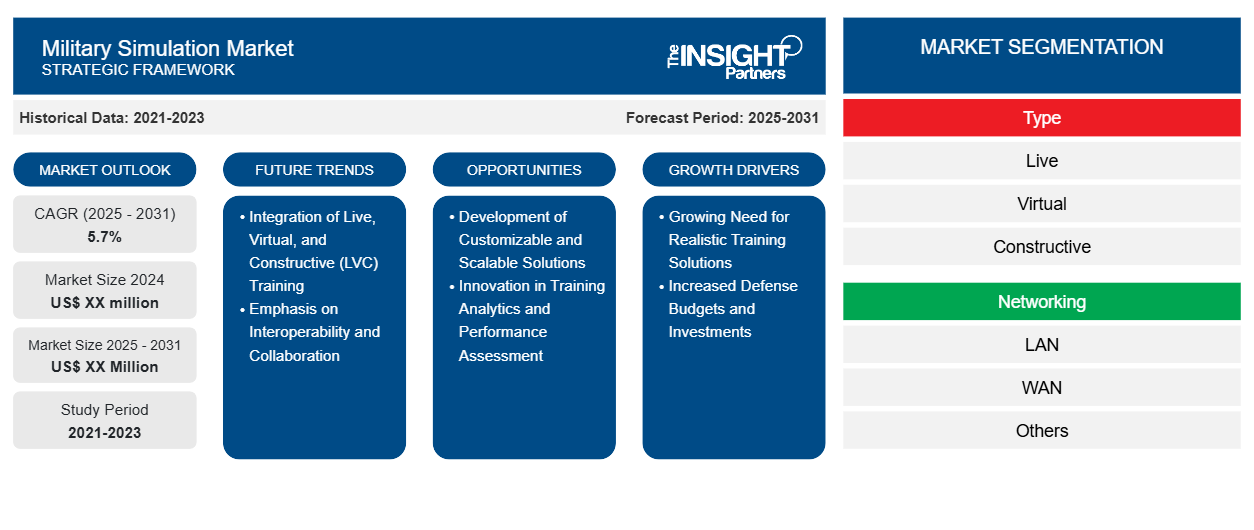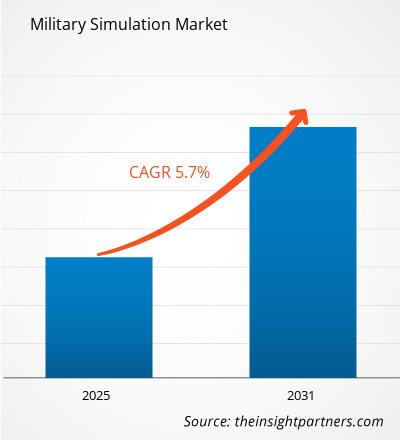The Military Simulation Market is expected to register a CAGR of 5.7% from 2025 to 2031, with a market size expanding from US$ XX million in 2024 to US$ XX Million by 2031.
The market is segmented into by Type , Networking, and Platform. The Type segment is divided into Live, Virtual, Constructive. Based on Networking, the global Ground Control Station market is segmented into LAN, WAN, Others. Based on Platform, the market is segmented into Vehicle, Battlefield, Boot Camp.
Purpose of the Report
The report Military Simulation Market by The Insight Partners aims to describe the present landscape and future growth, top driving factors, challenges, and opportunities. This will provide insights to various business stakeholders, such as:
- Technology Providers/Manufacturers: To understand the evolving market dynamics and know the potential growth opportunities, enabling them to make informed strategic decisions.
- Investors: To conduct a comprehensive trend analysis regarding the market growth rate, market financial projections, and opportunities that exist across the value chain.
- Regulatory bodies: To regulate policies and police activities in the market with the aim of minimizing abuse, preserving investor trust and confidence, and upholding the integrity and stability of the market.
Military Simulation Market Segmentation
Type
- Live
- Virtual
- Constructive
Networking
- LAN
- WAN
- Others
Platform
- Vehicle
- Battlefield
- Boot Camp
Geography
- North America
- Europe
- Asia-Pacific
- South and Central America
- Middle East and Africa
You will get customization on any report - free of charge - including parts of this report, or country-level analysis, Excel Data pack, as well as avail great offers and discounts for start-ups & universities
Military Simulation Market: Strategic Insights

-
Get Top Key Market Trends of this report.This FREE sample will include data analysis, ranging from market trends to estimates and forecasts.
Military Simulation Market Growth Drivers
- Growing Need for Realistic Training Solutions: The increasing complexity of modern warfare and the need for military personnel to be prepared for various scenarios is a significant driver for the military simulation market. Realistic training solutions that replicate real-world environments and situations are essential for effective military training. Simulations provide a safe and controlled environment where soldiers can practice tactics, decision-making, and teamwork without the risks associated with live exercises. As militaries worldwide prioritize effective training methods, the demand for advanced military simulation systems is expected to grow.
- Increased Defense Budgets and Investments: Many countries are increasing their defense budgets in response to evolving security threats and geopolitical tensions. This rise in defense spending is leading to greater investments in advanced training and simulation systems. Governments recognize the importance of preparing military personnel to face contemporary challenges, and as a result, they are allocating resources towards modernizing their training programs with cutting-edge simulation technologies. This trend is driving growth in the military simulation market.
Military Simulation Market Future Trends
- Integration of Live, Virtual, and Constructive (LVC) Training: A significant trend in the military simulation market is the integration of live, virtual, and constructive (LVC) training environments. This approach combines real-world exercises with virtual simulations and constructive elements to create a comprehensive training experience. By integrating these environments, military forces can conduct more complex training scenarios that improve coordination and interoperability among different units. This trend enhances the realism and effectiveness of training exercises, making LVC systems increasingly popular in military training programs.
- Emphasis on Interoperability and Collaboration: As military operations become more joint and coalition-based, there is a growing emphasis on interoperability and collaboration in military simulations. Training systems are being designed to facilitate collaboration among different branches of the military and allied forces, allowing for joint exercises and multi-national training scenarios. This trend enables forces to work together more effectively, improving readiness and ensuring that personnel are prepared for collaborative missions in real-world situations.
Military Simulation Market Opportunities
- Development of Customizable and Scalable Solutions: There is an opportunity for manufacturers to develop customizable and scalable military simulation solutions that can adapt to various training requirements and mission scenarios. Different branches of the military and allied forces may have unique training needs, and offering flexible solutions that can be tailored to specific operational contexts can create a competitive advantage. Companies that focus on developing modular systems that can be easily updated or expanded will likely find increased demand for their products.
- Innovation in Training Analytics and Performance Assessment: The integration of advanced analytics and performance assessment tools in military simulations presents significant opportunities. By leveraging data analytics, military organizations can track and evaluate trainee performance, identify areas for improvement, and enhance training effectiveness. Companies that develop simulation systems with robust analytics capabilities can provide valuable insights to military trainers and decision-makers, enabling more targeted and effective training programs. This focus on data-driven training solutions will likely become a key differentiator in the military simulation market.
Military Simulation Market Regional Insights
The regional trends and factors influencing the Military Simulation Market throughout the forecast period have been thoroughly explained by the analysts at The Insight Partners. This section also discusses Military Simulation Market segments and geography across North America, Europe, Asia Pacific, Middle East and Africa, and South and Central America.
Military Simulation Market Report Scope
| Report Attribute | Details |
|---|---|
| Market size in 2024 | US$ XX million |
| Market Size by 2031 | US$ XX Million |
| Global CAGR (2025 - 2031) | 5.7% |
| Historical Data | 2021-2023 |
| Forecast period | 2025-2031 |
| Segments Covered |
By Type
|
| Regions and Countries Covered |
North America
|
| Market leaders and key company profiles |
|
Military Simulation Market Players Density: Understanding Its Impact on Business Dynamics
The Military Simulation Market is growing rapidly, driven by increasing end-user demand due to factors such as evolving consumer preferences, technological advancements, and greater awareness of the product's benefits. As demand rises, businesses are expanding their offerings, innovating to meet consumer needs, and capitalizing on emerging trends, which further fuels market growth.

- Get the Military Simulation Market top key players overview
Key Selling Points
- Comprehensive Coverage: The report comprehensively covers the analysis of products, services, types, and end users of the Military Simulation Market, providing a holistic landscape.
- Expert Analysis: The report is compiled based on the in-depth understanding of industry experts and analysts.
- Up-to-date Information: The report assures business relevance due to its coverage of recent information and data trends.
- Customization Options: This report can be customized to cater to specific client requirements and suit the business strategies aptly.
The research report on the Military Simulation Market can, therefore, help spearhead the trail of decoding and understanding the industry scenario and growth prospects. Although there can be a few valid concerns, the overall benefits of this report tend to outweigh the disadvantages.
Frequently Asked Questions
What are the deliverable formats of the Ground Control Station market report?
What are the options available for the customization of this report?
What are some of the recent trends in the global Ground Control Station market?
Which are the leading players operating in the Ground Control Station market
What are the driving factors impacting the Ground Control Station market?
What is the expected CAGR of the Military Simulation Market Size and Forecasts (2021 - 2031), Global and Regional Share, Trends, and Growth Opportunity Analysis Report Coverage: By Type (Live, Virtual, Constructive); Networking (LAN, WAN, Others); Platform (Vehicle, Battlefield, Boot Camp) , and Geography (North America, Europe, Asia Pacific, and South and Central America)?
- Historical Analysis (2 Years), Base Year, Forecast (7 Years) with CAGR
- PEST and SWOT Analysis
- Market Size Value / Volume - Global, Regional, Country
- Industry and Competitive Landscape
- Excel Dataset
Recent Reports
Related Reports
Testimonials
Reason to Buy
- Informed Decision-Making
- Understanding Market Dynamics
- Competitive Analysis
- Identifying Emerging Markets
- Customer Insights
- Market Forecasts
- Risk Mitigation
- Boosting Operational Efficiency
- Strategic Planning
- Investment Justification
- Tracking Industry Innovations
- Aligning with Regulatory Trends





















 Get Free Sample For
Get Free Sample For